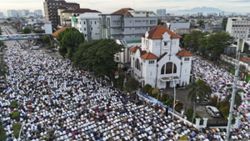Trends are changing as consumers become more health-conscious
GEORGE TOWN: There has already been a noticeable decline in the consumption of sweetened drinks, even before the introduction of the Sugar-Sweetened Beverages (SSB) tax, says Penang Grocery Association adviser Datuk Tan Piek Kean.
He said consumers have become more health-conscious now, with many opting for just plain water during festive gathering.
He said the shift marked a stark contrast to the traditional trend, where demand for sugary drinks would peak during festive seasons, as these beverages were often seen as essential for celebrations and feasts.
“The trend has shifted in recent years, even before the introduction of the SSB tax.
“It’s a struggle to sell sugary beverages, so I don’t believe the tax will impact future sales,” said Tan, a third-generation owner in the wholesale business.
Malaysia first introduced the SSB in July 2019 at 40sen per litre, which applies to ready-to-drink (RTD) packaged beverages that contain more than 5g of sugar per 100ml.
Under Budget 2025, the excise duty for SSB will go up to 90sen per litre starting Jan 1, next year.
Drinks that are freshly prepared and served at eateries are exempt from the tax.
Tan, who is former Federation of Sundry Goods Merchants Associations of Malaysia chairman, said most RTD beverages, including popular imported brands, contain sugar levels below the 5g/100ml threshold for the SSB tax.
He foresees prices should remain unchanged during the Christmas and New Year holidays, despite the scheduled tax increase in January next year.
“The canned and bottled drinks, from sodas to carbonated beverages, now contain between 4.6g and 4.9g of sugar per 100ml, which is below the threshold.
“Many consumers and businesses may be concerned that the tax applies to all sugary beverages.
“But prices should remain unchanged, so there is no need to worry,” he said at his shop in Lebuh Carnarvon here.
Store owner S. Pathmanathen, 37, said only a small number of drinks exceeds the sugar content threshold for the SSB tax, and that includes certain energy drinks and coffees.
“The government’s plan to increase the tax on sugary drinks is a beneficial move to curb consumption and improve health, though most SSBs remain exempted.
“More importantly, it raises consumer awareness and encourages regulation.
“Energy drinks are in low demand, and their price hike won’t significantly impact the market. Those who truly need them, like long-distance drivers, will pay a bit more,” he stated.
Pathmanathen added that beverage costs have risen by about 5% on average since last year, but the increase is due to overall rising costs, not the SSB tax.
In a report by The Edge, Fraser & Neave Holdings Bhd (F&N) said its RTD products with sugar content exceeding the 5g per 100ml tax threshold contribute less than 1% of the group’s total revenue.
The report added that 97% of Nestle (Malaysia) Bhd’s RTD products are also below the sugar tax threshold.










































